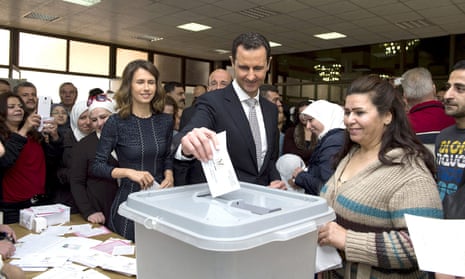Syrian peace talks resumed in Geneva on Wednesday as residents living in government-held areas went to the polls in parliamentary elections dismissed by the opposition and western backers as a sham.
State media showed a smiling Bashar al-Assad and his wife, Asma, voting near the presidential palace in Damascus. Crowds were filmed pouring into polling stations at the Hejaz railway station in the centre of the capital and close to the border with Lebanon to achieve what one TV correspondent called “constitutional stability”.
Voting was extended by five hours until midnight but is unlikely to produce any surprises in the 250-seat assembly or challenge the dominance of the Ba’ath party or loyal independents.
People in Aleppo chanted “Allah, Syria, Bashar – and that’s all we need” during a live broadcast from government-held parts of the city.
The anti-Assad opposition and the western and Arab countries which back it have dismissed the elections as a sham designed to demonstrate the sovereignty and independence of the Syrian state – even though large parts of the country are no longer under its control. Assad’s allies, Russia and Iran, have expressed their approval.
The Russian foreign minister, Sergei Lavrov, said the parliamentary elections were intended to avoid a “legal vacuum” before a transition.
“There is an understanding already that a new constitution should emerge as a result of this political process, on the basis of which new, early elections are to be held. But before this happens, one should avoid any legal vacuum … These elections held today are designed to play this role of not allowing a legal vacuum.”
A spokesman for the French foreign ministry, Romain Nadal, said “France denounces this shame of an election organised by the regime … They are being held without campaigning, under the auspices of an oppressive regime and without international observation.”
As voting got under way, opposition negotiators in Geneva met the UN envoy for Syria, Staffan de Mistura, just back from talks in Damascus and Tehran in search of what he has called a “critical mass” of support for a political transition to end a conflict that has cost about 470,000 lives and displaced millions.
“These elections aren’t real. In real elections, the voice of the people can be heard. The Syrian people have been shouting for five years: What they want is a free, democratic Syria,” said Salem al-Meslet, spokesman for the opposition Higher Negotiations Committee. “Syria’s future will not be decided by fake elections, but by the people, following a political transition. That is what we are in Geneva to negotiate.”
De Mistura, the third UN envoy since the crisis erupted, has said he wants this second round of talks to focus on concrete steps towards that transition – but the government has insisted that Assad’s continued rule is a red line and that negotiations must be about national unity and fighting terrorism. The Syrian deputy foreign minister, Faisal Mekdad, said on Wednesday the opposition had to let go of its “dream” of a transitional government, saying it would amount to a coup d’etat.
Assad’s officials, emphasising the importance of the elections, are due to arrive in Geneva on Thursday and will meet De Mistura on Friday. The two sides have not yet met face to face.
But both the election and the peace talks may well be overshadowed by renewed fighting that is threatening to end a six-week “cessation of hostilities” agreed between Russia and the US to try to keep the faltering political process on track.
“Right now, there are signs that this [the ceasefire] is slipping and it is a much more delicate environment for De Mistura to convene political talks,” the US ambassador to the UN, Samantha Power, told reporters in New York after a briefing by the envoy on Tuesday.
Power said Russia must put pressure on Assad to “get the regime back with the programme”, adding that she was very alarmed by Syria’s plans to launch a Russian-backed counter-offensive in Aleppo, the epicentre of the renewed fighting.
Iran’s deputy foreign minister, Hossein Amir Abdollahian, also voiced concerns about the uptick in fighting following De Mistura’s trip to Tehran, saying it was “disturbing and may interfere with the political process”.
The mainstream opposition coalition warned: “The Assad regime has clearly decided to escalate attacks on the Syrian people taking advantage of Russian and Iranian support and using the fight on terror as a pretext to justify these attacks.”
In one possible pointer to next steps, the Wall Street Journal reported that the CIA and its regional partners have drawn up plans to supply more-powerful weapons to anti-Assad rebels if the truce does collapse. Saudi Arabia has been pressing hard to supply anti-aircraft missiles to carefully vetted units.
